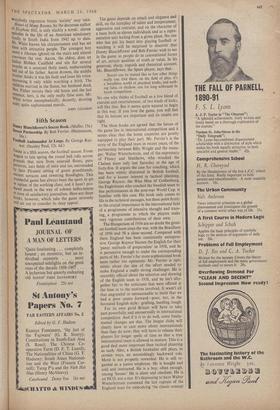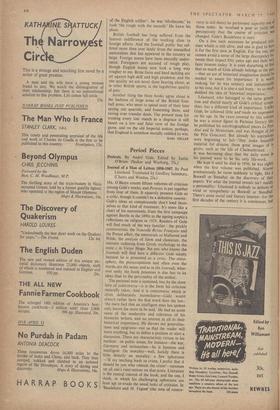Fifth Season
Football Ambassador At Large. By George Ray- nor. (Stanley Paul, 12s. 6d,) is a fifth season, the football season. From "'lust to late spring the round ball rolls across grounds that turn from emerald floors, pure ?arterres, into fields of mire and ice, surrounded °Y their Piranesi setting of gaunt grandstands, ancient terraces and towering floodlights. This wonderful game has always been the sport or art 21. opium of the working class; and it hasn't pro- "'Iced much in the way of solemn belles-lettres °r even of satisfactory journalism. Here ere three books, however, which take the game seriously and set out to consider its deep appeal.
The game depends on attack and elegance and skill, on the interplay of talent and temperament, aggression and restraint, and on the character of a team both as eleven individuals and as a repre- sentative unit hailing from a given place. No one who has put his heart into playing football or watching it will be surprised to discover that Danny Blanchflower and Bob Ferrier wish to see in the game, as people do in conventional forms of art, certain qualities of truth or value. In his generous, sharp, roguish and rhetorical account, Mr. Blanchflower, the Spurs player, says that : Soccer can be trusted like so few other things really can. Out there, on the field of play, it's a breathless world of practical truths, and noth- ing false, or shallow, can for long withstand its harsh competition. .
No one who thinks of football as a low blend of exercise and entertainment, of two kinds of kicks, will like that. But it seems quite natural to begin in this way. If you love the game, you will feel that its lessons are important and its results are right.
The three books are agreed that the future of the game lies in international competition and it seems clear that the home countries are poorly equipped to play their part. Mr. Ferrier's is the story of the England team in recent years, of the partnership between Billy Wright and the mana- ger, Walter Winterbottom, and of the supremacy of Finney and Matthews, who wrecked the Chelsea team only last Saturday at the age of forty-five. It argues the case for coaching, which has been widely distrusted in British football, and for a keener interest in tactical planning.
George Raynor, the Wise Man of Gothenburg, the Englishman who coached the Swedish team to fine performances in the post-war World Cup, is familiar with this case. His book only comes to life in the technical passages, but these point firmly to the crucial importance in the international field of a programme of intensive thought and train- ing„ a programme to which the players make very vigorous contributions of their own.
The Hungarians of 1954 are no doubt the great- est football team since the war, with the Brazilians of 1950 and 58 a close second. Compared with them England has been consistently unimpres- sive. George Raynor blames the English for their 'pansy methods of preparation' in 1958, and he is persuasive enough to make the corresponding parts of Mr. Ferrier's far more sophisticated book seem rather too optimistic. Mr. Ferrier is opti- mistic about the size of the effort needed to make England a really strong challenger. He is smoothly official about the selection and showing of the English team in 1958, and he isn't alto- gether fair to the criticisms that were offered at the time or to the motives involved. It wasn't all that ungrateful or unreasonable to insist that we had a poor centre forward—poor, too, in the favoured English style : grafting, bustling, tough.
For its own good Britain will have to take part powerfully and unreservedly in international competition. And if it is to do well, some funda- mental changes are due. The league clubs will clearly have to care more about internationals than they do now; they will have to release their players for longer spells of time so that a true international team is allowed to mature. This is a good deal more important than tactical planning as such. Also, a British footballer still plays, in certain ways, an astonishingly backward role.
Merit is not properly rewarded. He is still re- garded as a junior employee. He is bought and sold and instructed. He is a boy, often enough, among 'bosses.' He is silent and obedient. He is. an NCO, not a star. It's depressing to have Walter Winterbottom commend the last captain of the England team for embodying 'the classic concept
of the English soldier': he was 'wholesome,' he took the rough with the smooth': He knew his place.
British football has long suffered from the famous indifference of the working class to foreign affairs. And the football public has suf- fereil more than ever lately from the intensified nationalism that has appeared in the country at large. Foreign teams have been absurdly under- rated. Foreigners are accused of rough play, though English teams now look a long way rougher to me. Brute force and hard tackling are set against high skill and high prudence, and the one quality we are never done hearing about, as in other British sports, is the lugubrious quality of guts.
Another thing the three books agree about is the badness of large areas of the British foot- ball press, who seem to spend most of their time spying out quarrels, and fomenting them, and raving over transfer deals. The present taste for treating every lost match as a disgrace is still based on a low and false view of the foreign game, and on the old Imperial notion, perhaps, that England is somehow morally entitled to win.
KARL MILLER



















































 Previous page
Previous page